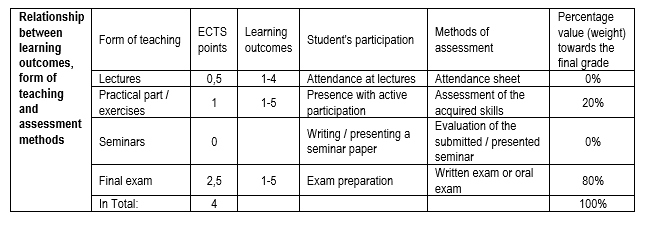Acquiring knowledge and skills necessary to determine the need for physical therapy treatment, planning and programming of the physical therapy processas well as choice and application of physical therapy procedures in accordance with the recipient’s needs.
Physical factors in physical therapy: definition and role in physical medicine and rehabilitation: electrodiagnostic procedures which precede physical therapy, electrotherapy, electrostimulation, thermotherapy and thermal diagnostics, ultrasound therapy, light therapy, paraffin treatment, basics of balneology and climatology, magneto-therapy, hydrotherapy, cryotherapy and cryokinetics, laser therapy, principles of symptomatic and causal treatment.
Obavezna literatura:
1. Jajić, I.: Fizikalna medicina i opća rehabilitacija. Zagreb: Medicinska naklada, 2000.
2. Bobinac-Georgijevski, A.: Fizikalna medicina i rehabilitacija u Hrvatskoj. Zagreb: Naklada Fran, 2000.
Dopunska literatura:
- Wadsworth H, Chanmugam APP. Electrophysical Agents in Physiothreapy: Therapeutic and Diagnostic Use. Marrickville, N.S.W., Australija: Science Press; 1998.
- Cameron M. Physical Agents in Rehabilitation: From Research to Practice. Philadelphia, SAD: W.B. Saunders Company; 1999.
- Hayes KW. Manual for Physical Agents. New Jersey, SAD: Prentice Hall; 1999.
Upon completion of this course, students will be able to:
- Recognize and critically evaluate the specifics of different models of physiotherapy in people with disorders and diseases of the cardiovascular and respiratory systems
- Recognize and critically evaluate the specifics of physiotherapy in people suffering from and treated for malignant diseases
- Apply physiotherapeutic procedures in the prevention of diseases of the cardiovascular and respiratory systems
- Apply physiotherapy procedures during the treatment of malignancy and recovery from surgery, chemotherapy or radiation
- Assess and critically analyse the effects of the physiotherapy process in people with disorders and diseases of the cardiovascular and respiratory systems, evaluate and critically analyze the effects of the physiotherapy process in people suffering from and treated for tumor diseases
- Actively participate in teamwork



